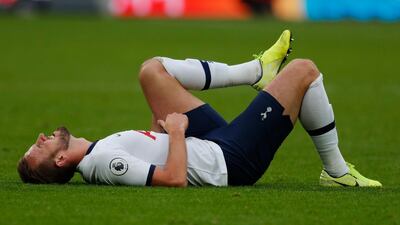Jose Mourinho’s tongue can be cutting and his language was particularly pointed. “We are playing without a striker,” he said at Middlesbrough. To be more accurate, Tottenham Hotspur were playing without Harry Kane.
They will be playing without him on Saturday against Liverpool and against Manchester City next month. In fact, Kane’s hamstring injury has resulted in him undergoing surgery that will see him out of action until April, at the earliest. But Tottenham were not playing without a striker on Sunday.
But Tottenham were not playing without a striker on Sunday. The line was led by Heung-Min Son, scorer of 69 goals in three-and-a-half seasons and their reigning Player of the Year.
Rather, they were playing without a Mourinho-style striker. Kane could be seen as the successor to Didier Drogba, Zlatan Ibrahimovic, Diego Milito and Diego Costa, Mourinho’s four totemic target men. Son certainly is not.
There is a separate argument that Romelu Lukaku lost his way by bulking up, slowing down and playing more with his back to goal in a bid to become the quintessential Mourinho striker. That option is scarcely available to the smaller Son.
Tottenham’s squad is such that there is a solitary senior specialist striker, in the sidelined Kane. Mourinho, ever reluctant to blood youth, said it was “too soon” to pick the Irish prodigy Troy Parrott as Kane’s deputy. The 17-year-old remained an unused substitute against Middlesbrough.
Which leaves him with two winger-strikers, in Son and Lucas Moura, men who can run beyond a defence and outscore many a striker but who do not offer the focal point Mourinho tends to require in attack. There are ways in which the squad Mauricio Pochettino bequeathed Mourinho suits the Portuguese. This is not one of them.
It was scarcely perfect for Pochettino, though. Kane’s ubiquity was such that the role of his deputy was hard to fill; given a promise of precious little first-team football when the regular was around, expected to score when he was not.
The goal-shy Vincent Jansson failed. Fernando Llorente, however, made a much better fist of it. The Spaniard could be bit-part player and big-game scorer, finding the net against Chelsea, Borussia Dortmund and, controversially, City last season.
His summer departure, coupled with Spurs’ inability to replace him, constituted one of Daniel Levy’s transfer-market failures especially as Kane’s injuries have become annual affairs. Pochettino was left short-staffed; Mourinho, considering his fondness for physical strikers, more so.
If it explains an interest in AC Milan’s Krzysztof Piatek, a strapping striker who once described Kane as his role model, Spurs face a familiar dilemma: do they spend too much on someone who reverts to a reserve when the top scorer is fit? And is such a player willing to settle for a status as the second choice?
It is a reason why Son and Lucas became invaluable; each could get plenty of first-team football on the flanks as well. Still more significantly, each can raise his game in Kane’s absence. The South Korean has 11 goals in his last 15 outings without Kane alongside him in the starting XI.
In the Englishman's absence, they shaped their extraordinary Champions League run last season, Son with two goals away at the Etihad Stadium and Lucas with the most dramatic of hat-tricks against Ajax. Arguably, Pochettino erred by benching the Brazilian and turning back to a semi-fit Kane for the final.
But if the most recent figures are bleak – Spurs have only four goals and five points from their last six league games without Kane – before then Pochettino’s side showed the resolve and resourcefulness to cope. Their fluidity and flexibility helped. They could adapt to a different kind of forward.
Mourinho plays more in straight lines, looking to the out-ball up to the target man; Kane, tellingly, was winning more headers per game under the Portuguese than his predecessor.
Mourinho presented himself as a changed man when he joined Spurs, one who had spent his time off learning lessons from the past. The last week has illustrated the game has evolved since Mourinho emerged as a new thinker.
Pep Guardiola won with a group of false nines on Tuesday. He and Jurgen Klopp would seem eminently capable of prospering with Son as their striker. But can Mourinho?


